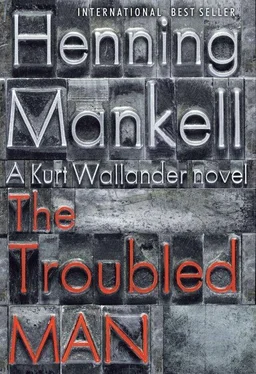When he finally stood up and went to see the chief of police, he had been sitting in the bathroom for over twenty minutes. If Martinsson called to say I was on my way, they probably think I’ve run off, he thought. But it’s not quite as bad as that.
Following two female police chiefs, Lennart Mattson had taken up his post in Ystad the previous year. He was young, barely forty, and had risen surprisingly quickly through the police bureaucracy, which is where most senior officers came from nowadays. Like most active police officers, Wallander regarded this type of recruitment as ominous for the ability of the police force to carry out its duties properly. The worst part was that Mattson came from Stockholm and complained often that he had difficulty understanding the Skåne dialect. Wallander was aware that some of his colleagues made an effort to speak as broadly as possible whenever they had to talk to Mattson, but Wallander refrained from such malevolent demonstrations. He had decided to keep to himself and not get involved in anything Mattson was doing, as long as he didn’t interfere too much in real police work. Since Mattson also seemed to respect him, Wallander had not had any problems with his new boss so far.
But he realized that things had now changed once and for all.
The door to Mattson’s office was ajar. Wallander knocked and went in when he heard Mattson’s high-pitched, almost squeaky voice.
A patterned sofa and matching armchairs had been squeezed into the office with considerable difficulty. Wallander sat down. Mattson had developed a technique of never opening a conversation if it could possibly be avoided, even if he was the one who had called the meeting. There was a rumor that a consultant from the National Police Board had sat in silence with Mattson for half an hour before standing up, leaving the room without a word having been spoken, and flying back to Stockholm.
Wallander toyed with the idea of challenging Mattson by not saying anything. But that would only have made him feel worse — he needed to clear the air as quickly as possible.
“I have no excuse for what happened,” he began. “I accept that it is indefensible, and that you have to take whatever disciplinary steps the regulations specify.”
Mattson seemed to have prepared his questions in advance, since they came out like machine-gun fire.
“Has it happened before?”
“That I’ve left my gun in a restaurant? Of course not!”
“Do you have an alcohol problem?”
The question made Wallander frown. What had given Mattson that idea?
“I’m a moderate drinker,” Wallander said. “When I was younger I suppose I drank a fair amount on the weekend. But I don’t do that anymore.”
“But nevertheless you went out boozing on a weekday evening?”
“I didn’t go out boozing . I went out for dinner.”
“A bottle of wine and a cognac with your coffee?”
“If you already know what I drank, why are you asking? But I don’t call that boozing. I don’t think any sane person in this country would call it that. Boozing is when you swill down schnapps or vodka, probably straight from the bottle, and drink in order to get drunk, not for any other reason.”
Mattson thought for a moment before his next question. Wallander was annoyed by his squeaky voice and wondered if the man sitting opposite him had the slightest idea of what police work in the field entailed, what horrific experiences it could involve.
“About twenty years ago you were apprehended by some of your colleagues for driving under the influence. They hushed it up, and nothing came of it. But you must understand that I wonder if you do in fact have an alcohol problem that you have been keeping under wraps, and which has now led to a most unfortunate consequence.”
Wallander remembered that occasion all too well. He had been in Malmö and had dinner with Mona. It was after their divorce, at a time when he still imagined he would be able to persuade her to come back to him. They had ended up arguing, and he had seen her being picked up outside the restaurant by a man he didn’t recognize. He was so jealous and upset that he took leave of his senses and drove home, instead of getting a hotel room or sleeping in the car. His colleagues brought him back to his apartment and parked his car there, and he heard nothing more about it. One of the officers who had arrested him that night was now dead; the other had retired. But evidently rumors were still buzzing around the station. That surprised him.
“I’m not denying that. But as you said yourself, it was twenty years ago. And I assure you, I don’t have an alcohol problem. If I choose to eat out one night in the middle of the week, I can’t see why that should be anybody’s business but my own.”
“I will have to take the necessary steps. Since you are due some vacation time and are not involved in a serious investigation at the moment, I suggest you take a week off. There will have to be an internal investigation, of course. That’s all I can say at the moment.”
Wallander stood up. Mattson remained seated.
“Is there anything you’d like to add?” he asked.
“No,” said Wallander. “I’ll do what you suggest. I’ll take time off and go home.”
“It would be best if you left your gun here.”
“I’m not an idiot,” said Wallander. “Irrespective of what you think.”
Wallander went back to his office and fetched his jacket. Then he left the police station via the garage and drove home. It occurred to him that he might still have alcohol in his blood after yesterday’s gallivanting, but since things couldn’t get any worse than they were, he kept on going. A strong northeasterly wind had blown up. Wallander shuddered as he walked from the car to his front door. Jussi was leaping around inside his kennel, but Wallander didn’t have the strength even to think about taking him for a walk. He undressed, lay down, and went to sleep. By the time he woke up it was twelve o’clock. He lay there motionless, his eyes open, and listened to the wind battering the house walls.
The feeling that something wasn’t as it should be had started nagging at him again. A shadow had descended over his existence. How had he not even missed the gun when he woke up? It was as if somebody else had been acting in his stead, and then had switched off his memory so that he wouldn’t know what had happened.
He got up, dressed, and tried to eat, although he still felt sick. He was very tempted to pour himself a glass of wine, but he resisted. He was doing the dishes when Linda called.
“I’m on my way,” she said. “I’m just checking that you’re at home.”
She hung up before he had chance to say a single word. She arrived twenty minutes later, carrying her sleeping baby. Linda sat down opposite her father on the brown leather sofa he had bought the year they moved to Ystad. The baby was asleep on a chair next to her. Kurt wanted to talk about her but Linda shook her head. Later, but not now; first things first.
“I heard what happened,” she said. “But even so, I feel as if I don’t know anything about it.”
“Did Martinsson call?”
“Yes, right after he spoke to you. He was very unhappy about it all.”
“Not as unhappy as I am,” said Wallander.
“Tell me what I don’t know.”
“If you’ve come here to interrogate me you might as well leave.”
“I just want to know. You’re the last person I’d ever have expected to do something like this.”
“Nobody died,” said Wallander. “Nobody even got hurt. Besides, anyone can do anything. I’ve lived long enough to know that.”
Then he told her the whole story, from the restlessness that had driven him out of the house in the first place, to not knowing why he had taken his gun with him. When he had finished she said nothing for a long time.
Читать дальше












